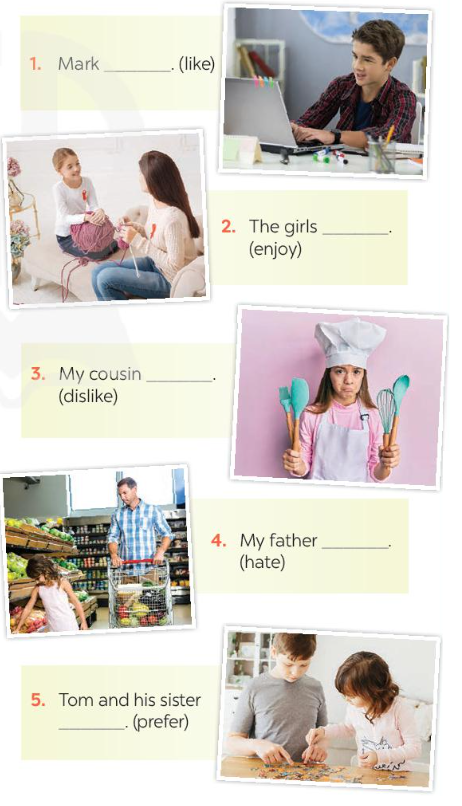Tiếng Anh 8 Unit 1 A Closer Look 21. Work in pairs. Put the verbs in the appropriate column. 2. Choose the correct answer A, B, or C. 3. Look at the pictures and complete the sentences, using the verbs in brackets in their suitable form. 4. Complete the sentences about yourself. 5. GAMES Like and dislikes mimes. Work in groups. One mimes a leisure activity he / she likes or dislikes. The others guess the activity by asking Yes / No questions using the verbs they have learnt. GÓP Ý HAY - NHẬN NGAY QUÀ CHẤT Gửi góp ý cho HocTot.Nam.Name.Vn và nhận về những phần quà hấp dẫn
Lựa chọn câu để xem lời giải nhanh hơn
Bài 1 Video hướng dẫn giải 1. Work in pairs. Put the verbs in the appropriate column. (Làm việc theo cặp. Xếp các động từ vào các cột phù hợp.)
Lời giải chi tiết:
Bài 2 Video hướng dẫn giải 2. Choose the correct answer A, B, or C. (Chọn đáp án đúng A, B, hoặc C.) 1. I love _____, so in my leisure time, I go to some villages near Ha Noi to relax and enjoy the outdoors. A. travelling B. travelled C. a travel 2. Tom enjoys _____ puzzles, especially Sudoku. A. doing B. do C. to do 3. When do you like _____ TV? A. watched B. watch C. to watch 4. Do you fancy _____ to the cinema this weekend? A. go B. going C. to go 5. I detest _____. I think it's cruel to harm animals. A. hunting B. to hunt C. hunt Lời giải chi tiết:
1. A I love travelling, so in my leisure time, I go to some villages near Ha Noi to relax and enjoy the outdoors. (Mình thích đi du lịch, nên vào lúc rảnh, mình đi đến vài ngôi làng gần Hà Nội để thư giãn và tận hưởng ngoài trời.) Giải thích: love + Ving: yêu thích làm việc gì đó 2. A Tom enjoys doing puzzles, especially Sudoku. (Tom thích giải các câu đố, đặc biệt là Sudoku.) Giải thích: enjoy + Ving: thích thú với việc gì đó 3. C When do you like to watch TV? (Khi nào bạn thích xem TV?) Giải thích: like + Ving/to V: thích làm gì đó 4. B Do you fancy going to the cinema this weekend? (Bạn có muốn tới rạp chiếu phim cuối tuần này không?) Giải thích: fancy + Ving: muốn làm gì đó 5. A I detest hunting. I think it's cruel to harm animals. (Tôi ghét cay ghét đắng việc săn bắn. Tôi thấy là thật độc ác khi làm hại động vật.) Giải thích: detest + Ving: ghét cay ghét đắng thứ gì đấy Bài 3 Video hướng dẫn giải 3. Look at the pictures and complete the sentences, using the verbs in brackets in their suitable form. (Nhìn vào các bức tranh và hoàn thành các câu sau, sử dụng dạng phù hợp của các động từ trong ngoặc.)
1. Mark _____. (likes) 2. The girls _____. (enjoy) 3. My cousin _____. (dislike) 4. My father _____. (hate) 5. Tom and his sister _____. (prefer) Lời giải chi tiết: 1. Mark likes surfing/ to surf the net. (Mark thích lướt mạng.) Giải thích: Thì hiện tại đơn dùng để diễn tả một thói quen hay sở thích. Ở đây Mark là tên riêng nên ta thêm s vào sau động từ like thành likes và like + Ving/to-V. 2. The girls enjoy knitting. (Các cô gái thích đan len.) Giải thích: Thì hiện tại đơn dùng để diễn tả một thói quen hay sở thích. Ở đây the girls là danh từ số nhiều nên ta giữ nguyên động từ và enjoy + V-ing. 3. My cousin dislikes cooking. (Em họ mình ghét nấu ăn.) Giải thích: Thì hiện tại đơn dùng để diễn tả một thói quen hay sở thích. Ở đây my cousin là ngôi ba số ít nên ta thêm s vào sau động từ dislike thành dislikes và dislike + V-ing. 4. My father hates going/ to go shopping. (Bố mình ghét đi mua sắm.) Giải thích: Thì hiện tại đơn dùng để diễn tả một thói quen hay sở thích. Ở đây my father là ngôi ba số ít nên ta thêm s vào sau động từ hate thành hates và hate + V-ing/to-V. 5. Tom and his sister prefer doing/to do DIY. (Tom và chị gái thích tự làm đồ thủ công hơn.) Giải thích: Thì hiện tại đơn dùng để diễn tả một thói quen hay sở thích. Ở đây Tom and his sister là ngôi ba số nhiều nên ta giữ nguyên động từ và prefer + V-ing/to V. Bài 4 Video hướng dẫn giải 4. Complete the sentences about yourself. (Hoàn thành các câu về bản thân.)
Lời giải chi tiết:
Bài 5 Video hướng dẫn giải 5. GAMES Like and dislikes mimes. (TRÒ CHƠI Kịch câm về sở thích và không thích.) Work in groups. One mimes a leisure activity he / she likes or dislikes. The others guess the activity by asking Yes / No questions using the verbs they have learnt. (Làm việc nhóm. Một người bắt chước một hoạt động giải trí mà anh ấy / cô ấy thích hoặc không thích. Những người khác đoán hoạt động bằng cách đặt câu hỏi Có / Không sử dụng các động từ họ đã học.) Example: (Ví dụ) A: Do you like surfing the net? (Bạn có thích lướt mạng không?) B: No, I don’t. (Không, mình không thích.) A: Do you love messaging your friends? (Bạn có thích nhắn tin với các bạn không?) B: Yes, I do. (Vâng, mình thích.) Lời giải chi tiết: A: Do you like doing DIY? (Cậu có thích làm đồ tự chế không?) B: No, I don't. (Mình không.) C: Do you love cooking? (Cậu có thích nấu ăn không?) B: Yes, I do. (Mình có.) A: Do you like doing the puzzles? (Cậu có thích giải câu đố không?) B: No, I don’t. (Mình không) A: Do you like doing housework? (Cậu có thích làm việc nhà không?) B: No, I don’t. (Mình không.)
>> Học trực tuyến lớp 8 trên Tuyensinh247.com. Đầy đủ khoá học các bộ sách: Kết nối tri thức với cuộc sống; Chân trời sáng tạo; Cánh diều. Cam kết giúp học sinh lớp 8 học tốt, hoàn trả học phí nếu học không hiệu quả. PH/HS tham khảo chi tiết khoá học tại: Link
|
|||||||||||||||||||||||||||||||||||||||||||




















